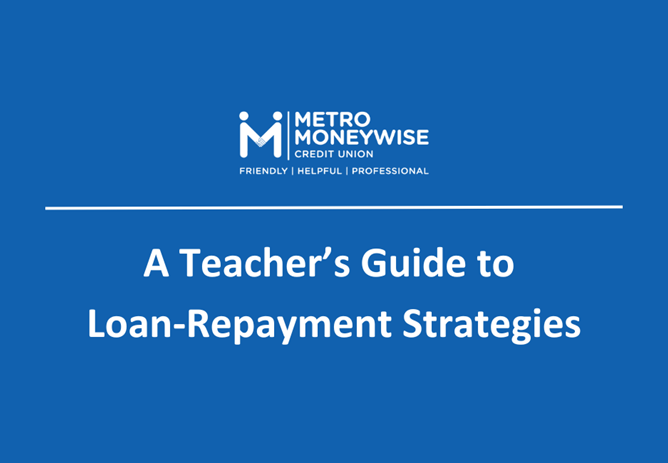11 August 2025
A Teacher's Guide To Loan Repayment Strategies
Paying back your loans as a teacher can seem like a challenge. Like lots of other professions, teachers’ modest salaries haven’t kept up with rising living costs. The result? Rent or mortgage payments, energy bills and other outgoings leave little left at the end of the month.
All that said, it’s important to have a plan in place to repay your loan (or loans). It will ensure financial stability, minimise stress and give you more time to focus on what you do best – teaching!
Below, we’ll look at some important considerations to make repaying your loan easier, prevent damage to your credit score and keep you on the right track financially.
Know your loan
Before we get into the ins and outs of repayment, it’s vital that you’re familiar with the terms of your loan – especially if you have multiple. There are lots of products classed as loans which teachers can take out in the UK, including personal loans, car finance, credit cards and overdrafts:
- Personal loans for teachers come with fixed interest rates and monthly repayments. They’re paid back over a set term, making them easy to budget for – but you should always check for early repayment fees if you want to pay your loan off early.
- Car finance includes hire purchase (HP) and personal contract purchase (PCP) agreements. As well as interest, you may have to pay a balloon payment (with PCP) at the end of the term if you want to own your car outright.
- Credit cards typically come with higher interest rates once your introductory offer has ended. You can be repaying these for a much longer period, depending on how much you pay off each month.
- Overdrafts can be convenient for short-term cash flow, but they usually come with steep daily or monthly charges. That makes them hard to pay back if you go too far into one.
Whatever type of loans you’re dealing with, make sure you know what the interest rates are and whether they’re fixed or variable. Fixed interest rates mean you pay the same back each month, while variable rates can rise or fall in line with the Bank of England base rate.
You should also check for any fees or penalties for early repayment and late or missed payments, so you’re clear on all the potential costs involved. This will make it easier to prioritise repayments if you have multiple loans on the go.
Choosing a debt repayment strategy
Once you know what you owe, it’s time to decide on a strategy. The goal here is to minimise the interest you’re paying overall and become debt-free as soon as possible. Below, we’ll outline three common strategies – debt avalanche, debt snowball and debt consolidation.
Debt avalanche
For the debt avalanche strategy, list all your debts from the highest interest rate to the lowest – ignore the balances for now. You’ll then pay the minimum on all except the top one with the highest interest rate. For that one, pay as much as you possibly can. Once it’s cleared, move on to the next highest interest rate. It will save you more money over time by eliminating expensive interest as soon as possible.

Debt snowball
On the other hand, you have the debt snowball method. For this, list debts by the balance – smallest to largest. Pay the minimum for all of them except the first (with the smallest balance). Clear this one as quickly as you can. This allows you to repay more loans more quickly, which can be more motivating.
Debt consolidation
Finally, there’s debt consolidation. This basically means getting a loan to pay off your debt. It’s advantageous if you get a lower interest rate on your debt consolidation loan, because you can then pay off higher-interest loans immediately to save money overall.
This is something we can help with at Metro Moneywise Credit Union – so long as the loan is affordable and will improve your financial position going forward. Our team will work with you to check affordability and find the right solution.
Getting on top of repayments as a teacher
Whichever strategy you opt for, you’ll need to stay on top of budgeting to make sure you have the money for repayments.
Basic budgeting
Start by listing all your essentials – mortgage or rent payments, utilities, council tax, transport and food. Then add your minimum debt repayments as non-negotiables like you would with a standard bill.
Scheduling repayments
Set up standing orders or direct debits to automate repayments. As a teacher, you might want to schedule repayments just after payday. This will reduce any temptation to spend money that’s earmarked for loans – helping you avoid fees for late or missed payments.
Managing your income
While your main teaching income is fixed, there might be other seasonal factors that can help you pay off your loan. For example:
- With the long summer holidays, teachers have fewer expenses in the summer. That could give you a bit more free money for repayments – just be sure to check for early repayment fees!
- Some teachers have the opportunity for extra income from exam marking at the end of term or tutoring. Again, this could provide some much-needed funds to help get you back in the black.
- You should also make the most of any teacher discount schemes available to minimise your expenditure both in and out of school. Money Saving Expert has a good guide to discounts for teachers.
Avoiding common pitfalls
Last but not least, you’ll want to watch out for pitfalls that could make your situation harder. These include:
- Taking on new high-interest debt while repaying old loans. Payday lenders often prey on people who are struggling and use misleading tactics to lure teachers in.
- Missing payments. As well as incurring fees, you could damage your credit score and make it harder to get loans in the future.
- Ignoring early repayment penalty clauses. We’ve mentioned this a couple of times, but it really is vital that you check the small print to avoid unexpected fees when you’re trying to pay off your debt.
Related: 6 Schoolboy Errors to Avoid with Teacher Loans
Affordable loans and safe saving for teachers
If you’re a teacher looking to get on top of your finances, Metro Moneywise Credit Union is here to help. Education is part of our common bond, meaning all teachers can join our credit union, apply for loans and save safely with lifetime support.
That includes debt consolidation loans to get back in the black or just personal loans for things like home improvement, holidays or car repairs. Whatever the case, we’ll carry out full affordability checks to make sure repayments are manageable – and there are no early repayment fees, so you’re free to pay your loan off early if it suits you.
Sound good? Click the link below to join online. Or call our team on 01706 298966 to find out more.



